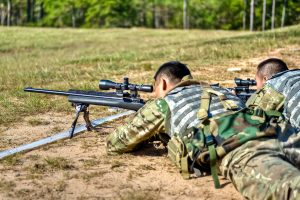Chinese warplanes used to buzz Taiwan’s air defense identification zone (ADIZ) every so often – in conjunction with an election, a visit from a U.S. official, or a particularly bold speech by Taiwan President Tsai Ing-wen.
Lately, intrusions by Chinese military aircraft have become closer to a daily occurrence, leading the United States to reconsider its defense policy and Taiwan’s military to evaluate its own preparedness for a possible Chinese attack.
Taiwan’s state-run Central News Agency reported on September 30 that the military is considering increasing the frequency of call-ups of reservists, an indication that it wants to ensure its combat readiness amid the uptick in Chinese military threats.
The proposal would see reservists called up annually rather than every two years, CNA reported. Taiwan’s Reserve Command would also be merged into the army’s command headquarters in 2023, according to the proposal.
This change comes as Taiwan’s military readiness faces scrutiny from domestic and international critics. The country’s resolve faces a test from its primary antagonist, Beijing, which has escalated military operations near Taiwan’s maritime and aerial borders.
Taiwan’s Defense Ministry said on September 25 that China had threatened or entered into the Taiwanese ADIZ 46 times in a period of nine days, actions which Taiwan called “provocative.”
Days earlier, Foreign Minister Joseph Wu demanded that China “back off” and “return to the civilized international standards” in response to comments from a Chinese Foreign Ministry spokesperson that there is no median line in the Taiwan Strait due to Beijing’s stance that Taiwan is a part of Chinese territory.
The uptick in Chinese military pressure came in conjunction with a visit to Taiwan by U.S. Under Secretary of State Keith Krach. That high-profile visit came just over a month after a visit by Alex Azar, the U.S. health secretary, which was also met with Chinese opposition.
Taiwan and the United States are in the midst of a potential bumper crop of unofficial relations and bilateral agreements. Azar and his Taiwanese counterparts in August signed memorandums of understanding promoting cooperation in public health and the development of a COVID-19 vaccine.
The countries are also exploring a bilateral trade agreement after Tsai decided to allow U.S. pork imports containing a controversial additive, a move that eliminated a key barrier to negotiations.
For Taiwan’s democratic government, deciding to pursue stronger ties with the U.S. comes at a cost of military and political pressure from the Chinese Communist Party, which claims sovereignty over Taiwan despite never having ruled it.
The U.S. has long abided by a policy of “strategic ambiguity” toward its defense commitments to Taiwan – meaning it vows to assist Taiwan’s defense capabilities but refuses to state whether or not U.S. troops will defend Taiwan against Chinese military attacks.
The Financial Times reported in August top U.S. officials have internally debated reconsidering the policy of “strategic ambiguity,” possibly hinting at a formal and public U.S. commitment to defending Taiwan from the Chinese military.
This has led to stark evaluations of Taiwan’s own military preparedness that have kept Taiwan’s Defense Ministry on its toes in response to a skeptical public.
A recent article by Michael A. Hunzeker and Dennis L. Weng in War on the Rocks calls for the United States to convince Taiwan to clarify its own commitment to military readiness, noting that mandatory military service in Taiwan is seen by many young conscripts as a “waste of time.”
Taiwan has tried to phase out conscription since the administration of previous President Ma Ying-jeou. At present, young men are required to serve for four months. Women are not required to serve.
Hunzeker and Weng proposed that Taiwan lengthen its period of mandatory service to two years. Such a policy, however, could be deeply unpopular among the young voters courted by the ruling Democratic Progressive Party (DPP).
Current and former military generals have anonymously criticized Taiwan’s preparedness measures despite the country’s big-money purchases of U.S. weapons.
Tsai won reelection in a January landslide by promising to protect Taiwan from Chinese threats. She will now have to convince the public that the military is ready to fight if those threats turn into full-scale attacks.
A previous version of this piece erroneously referred to Taiwanese airspace rather than the Taiwanese ADIZ.

































